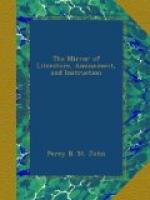The effects of disappointed love ......_Akenside._ Part of a lady’s dress ................_Spencer._ What the ladies do, and a weight ......_Chatterton._ A manufactory, and a weight ..........._Milton._ The prayers of a glutton .............._Moore._ An indication of old age .............._Gray._ What a mortgage will do ..............._Cumberland._ The contributions of a miser .........._Little._ A troublesome companion ..............._Bunyan._ The soldier’s home, and an alarm ......_Campbell._
* * * * *
The Pyramids.—The Egyptians, according to Herodotus, hated the memory of the kings who built the pyramids. The great pyramid occupied a hundred thousand men for twenty years in its erection, without counting the workmen who were employed in hewing the stones and conveying them to the spot where the pyramid was built. Herodotus speaks of this work as a torment to the people, and doubtless, the labour engaged in raising huge masses of stone, that was extensive enough to employ a hundred thousand men for twenty years, equal to two millions of men for one year, must have been fearfully tormenting. It has been calculated that the steam engines of England worked by thirty-six thousand men, would raise the same quantity of stones from the quarry, and elevate them to the same height as the great pyramid, in the short space of eighteen hours. It was recorded on the pyramid, that the onions, radishes, and garlic, which the labourers consumed, cost sixteen hundred talents of silver, which is equivalent to several million pounds.
SWAINE.
* * * * *
The generality of mankind will not bear to be viewed too closely, or too often: they lose their value on a nearer approach; which made the honest countrymen say to his friend, who was boasting of a legacy bestowed upon him by a person, into whose company he had accidentally fallen only once in his life, “Ah, Jonathan, if he had seen thee twice, he would not have left thee a farthing.”
Friendship.—Friendship is of so delicate and so nice a texture, so defenceless against evil impressions, and so apt to wither at the least blast of jealousy, that we may say with Horace,
Felices ter et amplius,
Quos irrupta tenet copula; nec malis
Divulsus querimoniis,
Suprema citius solvet amor die.
Ode
13, lib. i.
“Happy, thrice happy they, whose
friendships prove
One constant scene of unmolested love,
Whose hearts right temper’d feel
no various turns,
No coolness chills them, and no madness
burns.
But free from anger, doubts, and jealous
fear,
Die as they liv’d, united and sincere.”
* * * * *
The love between friends is certainly most harmonious when wound up to the highest pitch; but at that very time, is in greatest danger of breaking: and upon the whole, the strongest friendships may be compared to the strongest towns, which are too well fortified to be taken by open attacks; but are always liable to be undermined by treachery or surprise.




